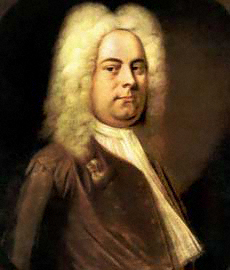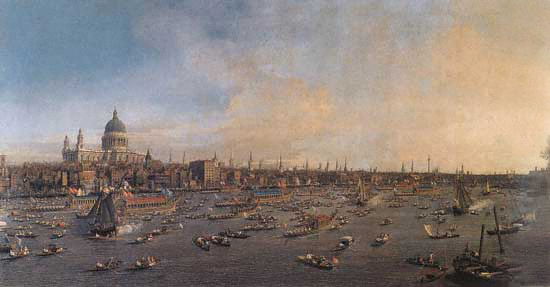

George Friederich Handel (1685-1759) was the composer of "Hornpipe," one of the pieces from his Water Music Suite. Although Handel was born in Germany, he spent most of his adult life as a musician in England. He showed an early interest in music, but his father, a barber-surgeon, wanted him to be a lawyer. Handel's musical talent was so apparent that his father finally gave his reluctant approval for him to study music. Following Handel's graduation from the University of Halle, he became a church organist for a brief period, and then moved to Hamburg where he composed his first opera in 1705. In 1706, Handel moved to Italy for several years to further his interest in Italian music, and while there, he received acclaim as a promising young composer.
In 1709, Handel was offered the position of Music Director for the Elector of Hanover, and he returned to Germany. Handel felt stifled as a composer there, and remained in Germany for only a brief time. He requested extended leaves of absence from his music position so he could travel to London to compose and produce operas and other musical works. In 1714, Handel was still in England and was faced with a dilemma when his German employer, the Elector of Hanover, was appointed George I of England. Handel apparently was able to redeem himself with the king, and was offered a position as a court composer. Handel spent most of his musical life in London, supported by the patronage of the royal family and other prominent members of the aristocracy. He also sought ways to make money through other means such as through the sale of subscription tickets (tickets were pre-sold to a series of concerts), and by seeking commissions for his music. Handel was internationally recognized as a superb composer of music in almost all genres: instrumental works, operas, oratorios, sacred vocal music, and keyboard music, and his compositional techniques foreshadowed many progressive elements of the Romantic era. [4]

Handel wrote his orchestral suite, Water Music, in 1717 to provide musical entertainment for King George I and his guests as they traveled along the Thames River in a royal barge procession (the orchestra of 50 musicians was on its own barge). The musical definition of a suite is a collection of pieces, put together in an ordered manner. During the Baroque era, pieces in a suite were often dance forms such as: prelude, allemande, courante, saraband, gigue, bourre, gavotte, and minuet. After the Baroque era, suites often were pieces extracted from a larger work such as The Nutcracker Suite, a compilation of pieces taken from the ballet The Nutcracker.
TECHNIQUE TIPS: This piece, "Hornpipe" from Handel's Water Music, has the 3/2 meter and musical form of the country dance version of the hornpipe. Handel indicated that this movement should be played allegro (a quick, lively and fast tempo), and that it should begin with the dynamic level of f (meaning forte, play loudly with a strong sound). Be sure to contrast the dynamics of the beginning section (measures 1-11), with the mp section beginning in measure 12 (mp means mezzo piano, moderately soft). The main theme and forte section return in measure 28 to the end.
© Copyright 2025 RK Deverich. All rights reserved.
Although this online cello class is provided free of charge, all rights are reserved and this content is protected by international copyright law. It is illegal to copy, post or publish this content in any form, and displaying any of this material on other websites, blogs or feeds is prohibited. Permission is given for individual users to print pages and perform music from this website for their personal, noncommercial use.